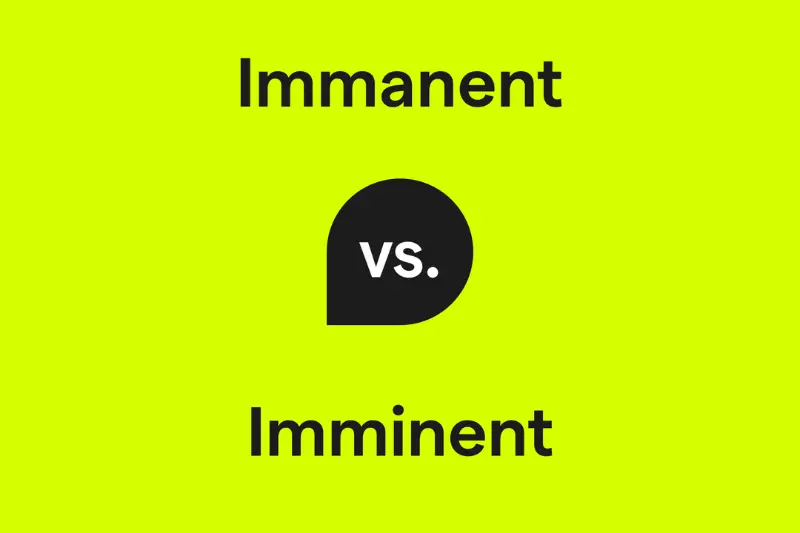Imminent vs Eminent – What’s the Difference?
Published: 9 Jun 2025
Introduction
Understanding the difference between imminent vs eminent and “immanent” is crucial for anyone looking to master precise and professional English. These words may
sound somewhat similar but have completely different meanings and uses. Confusing them can lead to misunderstandings in both writing and conversation.
In this article, we’ll break down the meanings, examples, and usage of each term. You’ll also find comparison charts and grammar tips to help you clearly distinguish between:
- Imminent vs Eminent
- Immanent vs Imminent
- Immanent vs Eminent
What Does “Imminent” Mean?

Imminent (adjective) means something is about to happen very soon — especially something bad or dangerous.
Examples:
- A storm is imminent.
- The company is facing an imminent collapse.
- Think: Imminent = Immediate danger or event
What Does “Eminent” Mean?
Eminent (adjective) means famous, respected, or distinguished, especially in a particular profession or field.
Examples:
- She’s an eminent scientist.
- The conference will host many eminent scholars.
- Think: Eminent = Excellent reputation
Eminent vs Imminent – Key Differences

| Feature | Eminent | Imminent |
| Meaning | Highly respected or well-known | About to happen (soon) |
| Usage | Positive (status/achievement) | Neutral or negative (often danger) |
| Example | An eminent lawyer | A crisis is imminent |
Tip: “Eminent” = fame; “Imminent” = time
Immanent vs Imminent – Not the Same!
Immanent means existing or operating within something — especially in philosophy or religion.
Examples:
- God is immanent in all living beings.
- Beauty is immanent in nature.
Compare:
- A war is imminent (about to happen)
- God’s presence is immanent (dwelling within)
Tip: Immanent = internal | Imminent = incoming
Imminent vs Immanent – Easy Explanation
These two are often confused in writing. Remember:
- Imminent = Soon to happen
- Immanent = Existing within something
Both are adjectives but with completely different meanings.
| Word | Meaning | Example |
| Immanent | Existing within; inherent | Love is immanent in every human being. |
| Eminent Well-known, | respected | He is an eminent lawyer. |
Ans: “Imminent” means something is about to happen very soon, often something urgent or dangerous. “Eminent” refers to someone who is well-known, respected, or distinguished in a field.
Ans: No. Imminent is used for events or situations, not people. For example, “The storm is imminent” is correct, but “He is an imminent doctor” is incorrect.
Ans: Eminent is usually positive. It is used to praise someone’s achievements or reputation, such as “an eminent scientist” or “an eminent leader.”
Ans: Immanent means inherent or existing within something. It is often used in philosophical or spiritual contexts, like “God is immanent in nature.”
Ans: Imminent refers to something that is about to happen soon. Immanent refers to something that is internal or within.
Ans: They are not true homophones, but they are near-homophones — they sound very similar and are often confused in writing.
Ans: Yes, in a metaphorical or spiritual sense. For example, a spiritual leader can be eminent (respected) and their influence can be immanent (felt within followers).
Ans: Use this trick:
Imminent = Immediate (event)
Eminent = Excellent (person)
Immanent = Inner (philosophy)
Final Words
In the world of English writing and communication, using the right word makes a big difference. Imminent, eminent, and immanent are often misused due to their similar
sounds — but now you know exactly how and when to use each one.
To recap:
Imminent = something about to happen (e.g., “a storm is imminent”)
Eminent = someone highly respected or famous (e.g., “an eminent professor”)
Immanent = something inherent or existing within (often philosophical or spiritual)
Knowing these distinctions will not only sharpen your writing but also enhance your clarity and professionalism. Bookmark this article for future reference, and feel free to share it with others who often mix up these commonly confused terms.
Still confused about similar words? Drop a comment or message — and we’ll cover that in our next grammar guide!

- Be Respectful
- Stay Relevant
- Stay Positive
- True Feedback
- Encourage Discussion
- Avoid Spamming
- No Fake News
- Don't Copy-Paste
- No Personal Attacks



- Be Respectful
- Stay Relevant
- Stay Positive
- True Feedback
- Encourage Discussion
- Avoid Spamming
- No Fake News
- Don't Copy-Paste
- No Personal Attacks





